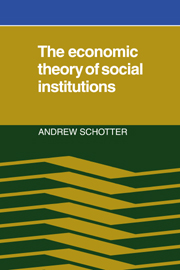Book contents
5 - Toward a neo-institutional approach to economics
Published online by Cambridge University Press: 05 November 2011
Summary
One of the demands that confronts social scientists is the demand for relevance. For many, this demand is a curse because it robs social scientists of their ability to justify total abstraction. The inevitable question in social science is always: “So what? What difference does this make to the real world?”
It is my belief that there are two methodological responses to this demand. One is a response in which the social scientist makes his work directly applicable to meaningful empirical questions. This is what the layman usually sanctions as “relevant” social scientific research. The other approach, however, and one that I feel is equally relevant, is an approach that aims not to change the real world directly but rather to alter the way we view the real world by changing the prevailing theoretical paradigm existing among scholars. In other words, one approach is to theorize directly about the real world, whereas the other is to theorize about the theory existing to describe the real world (i.e., to be metatheoretical). My aim in this book was closer to the latter approach than to the former. What I have written may not be as directly applicable to the real world as it is to the way we view that world. I have tried to broaden the institutional frame of reference that we use to analyze empirically relevant social phenomena and to open up a new set of questions that could be asked about such phenomena. Consequently, the theory presented here is one step removed from direct application, yet still potentially applicable.
- Type
- Chapter
- Information
- The Economic Theory of Social Institutions , pp. 144 - 164Publisher: Cambridge University PressPrint publication year: 1981



